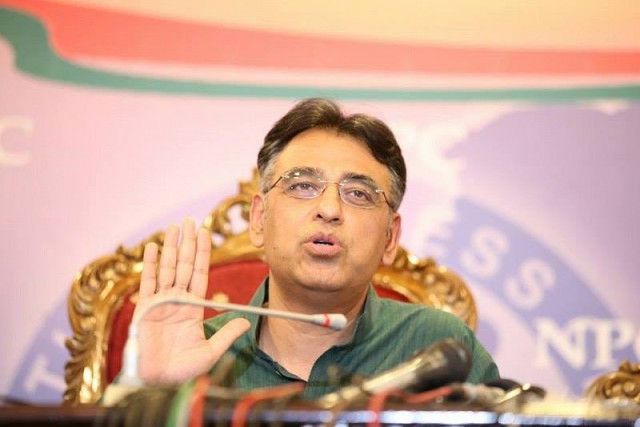ECC puts off decision on gas outages in winter
Allows import of cotton from Afghanistan to bridge shortfall

Finance Minister Asad Umar. PHOTO: PTI
The Economic Coordination Committee (ECC) of the cabinet faced a difficult choice of either permitting widespread gas load-shedding in Punjab and Khyber-Pakhtunkhwa (K-P) or announcing a subsidy for the provision of imported liquefied natural gas (LNG) at affordable prices.
For the time being, it deferred the decision, directing the Petroleum Division to come up with category-wise impact of load-shedding on the consumers.
As winter arrives in the country, the available indigenous gas will merely meet 60% of the needs.
Against the demand for over 6 billion cubic feet of gas per day (bcfd), the available indigenous gas stands at only 2.22 bcfd, the Petroleum Division informed the ECC.
Sui Northern Gas Pipelines Limited (SNGPL) supplies gas to Punjab and K-P consumers. It reported that against average consumption of 867 million cubic feet per day (mmcfd) by domestic and commercial consumers, the available supply is only 528 mmcfd. The gas supplier projected a domestic shortfall of 339 mmcfd for this year. Last year, it had bridged the gap by diverting gas from industries and providing re-gasified LNG.
The Petroleum Division presented three options to the ECC for a decision. It recommended that SNGPL may be allowed to inject re-gasified LNG volumes for consumption by domestic and commercial consumers provided the Oil and Gas Regulatory Authority (Ogra) allowed the volumetric adjustment and financial impact on a cost-neutral basis in line with the ECC’s decision of May 2018.
Ogra supported the option where the domestic consumers would be protected due to ring-fencing of re-gasified LNG prices. SNGPL estimates that one million British thermal units (mmbtu) of re-gasified LNG are expensive by Rs35.63 compared to the cost of indigenous gas. This cannot be passed on to end-consumers due to various legal hitches.
The second option was that given the wide difference in the sale price of natural gas for domestic use and the re-gasified LNG price, direct subsidy may be considered for SNGPL for injecting LNG volumes for domestic and commercial consumers based on the actual LNG consumption from December 2018 to February 2019.
The Ministry of Finance, however, rejected the subsidy proposal and asked the Petroleum Division to cross-subsidise the re-gasified LNG.
The third option was that in the absence of re-gasified LNG injection and no provision of the subsidy, SNGPL would manage the load of domestic and commercial consumers through pressure management during off-peak hours. This will result in either full disruption of the supplies or very low gas pressure which will make it difficult to cook.
Cotton import
The ECC approved the import of cotton from Afghanistan through the Torkham border amid concerns expressed by the Ministry of National Food Security about the lack of fumigation of the imported commodity.
The ECC directed that phytosanitary conditions should be strictly complied with, according to a statement issued by the finance ministry.
The Ministry of National Food Security was of the view that cotton was a sensitive crop and attracted a variety of pests. The crop requires pest scouting by the exporting country and on that basis, the fumigation process is a must to counter such threats.
The ministry also held the opinion that according to the Plant Quarantine Act 1976, cotton could only be imported via the sea route since quarantine facilities are only available in Karachi.
Furthermore, for the majority of the cotton, Afghanistan is only a transit route and for this purpose, pest scouting should be conducted by the Central Asian states, otherwise, domestic cotton will be threatened by new insects.
Against the consumption of nearly 15 million bales, Pakistan produces 10-12 million bales each year. The gap is filled by importing medium and long-staple cotton through the sea route. Last year, Pakistan imported 3.58 million bales of cotton.
This year, cotton production is projected to drop to 10.64 million bales against the target of 14.3 million bales. Textile manufacturers will have to import around 4 million bales in the year.
The cabinet body gave the go-ahead for the release of Rs1.1 billion to address the issues being faced by the families of deceased employees of the Pakistan Steel Mills.
Published in The Express Tribune, November 23rd, 2018.
Like Business on Facebook, follow @TribuneBiz on Twitter to stay informed and join in the conversation.



















COMMENTS
Comments are moderated and generally will be posted if they are on-topic and not abusive.
For more information, please see our Comments FAQ